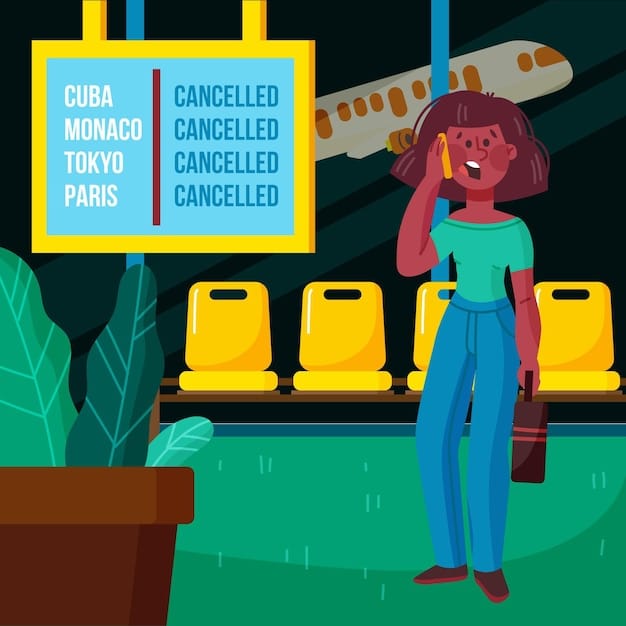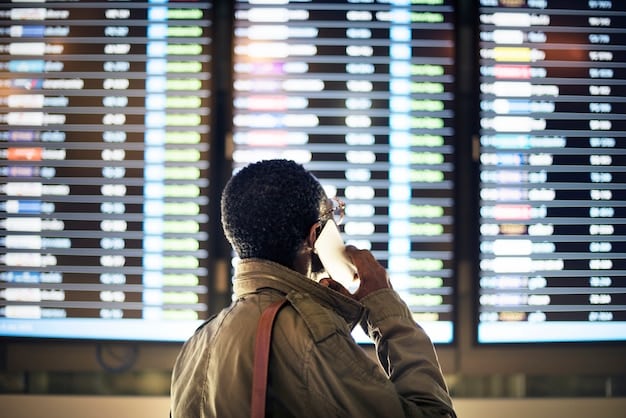Alert: Major airline flight cancellations nationwide due to system outage—Know your rights

A major US airline has announced an immediate, nationwide cancellation of flights following a critical system outage, leaving thousands of passengers stranded and raising urgent questions about passenger rights, compensation, and rebooking options in such unforeseen circumstances.
The travel landscape can shift dramatically in an instant, and few events disrupt personal plans or business schedules as profoundly as an unexpected airline system failure. Recently, a major US carrier issued an alert: major airline announces immediate cancellation of flights nationwide due to system outage – passenger rights quickly becoming a paramount concern for those affected. This unprecedented disruption has left a multitude of travelers stranded, grappling with immediate changes to their itineraries and an urgent need for clarity regarding their entitlements amidst the chaos.
Understanding the Immediate Impact of a Nationwide System Outage
When a major airline experiences a nationwide system outage, the repercussions are felt far and wide, extending beyond just the immediate disruption at the airport. Such an event typically brings flight operations to a grinding halt, affecting check-in processes, boarding, baggage handling, and even real-time communication with passengers. The sheer scale of a nationwide cancellation means that thousands, if not tens of thousands, of travelers are impacted simultaneously across multiple cities and regions. The immediate objective for affected passengers becomes understanding the scope of the problem and discerning what steps to take next.
The speed at which information is disseminated is crucial during these times. Airlines are often under immense pressure to provide timely updates, though initial communications can sometimes be vague as the extent of the outage is still being assessed. Passengers often find themselves in a state of uncertainty, unsure if their flight will be merely delayed or outright canceled. This ambiguity often leads to long queues at customer service desks and overwhelmed call centers, adding to the stress of an already frustrating situation.
Initial Steps for Stranded Passengers
Upon learning of a major system outage and subsequent flight cancellations, passengers should prioritize verifying the status of their specific flight and understanding any initial directives from the airline. While airport staff provide on-site assistance, digital channels often serve as quicker sources of information. It’s often advisable to check the airline’s official website or app, as these platforms are usually updated in real-time.
- Verify Flight Status: Do not rely solely on email or text notifications, as these can sometimes be delayed. Constantly refresh the airline’s official website or app.
- Monitor Official Communications: Pay close attention to announcements from the airline via their public address systems, social media channels, and news releases.
- Gather Documentation: Keep your boarding pass, booking confirmation, and any related communication readily accessible. This information will be vital for rebooking or compensation claims.
Beyond these immediate steps, passengers should also consider their immediate needs, such as accommodation if they are stranded far from home, or alternative transportation if the cancellation is prolonged. The ripple effect of a major system failure can extend for days, impacting subsequent flights even after the primary issue has been resolved, making proactive planning essential.
Navigating Passenger Rights: What Are You Entitled To?
When an airline cancels flights due to a system outage, passengers often wonder about their rights. Unlike cancellations due to weather, which are often considered “acts of God” and limit airline liability, system failures are generally seen as within the airline’s control. This distinction significantly impacts what passengers can expect in terms of assistance and compensation.
In the United States, the Department of Transportation (DOT) outlines certain rights for airline passengers. While there isn’t a federal law requiring airlines to compensate passengers for delays or cancellations, most major carriers have their own Contract of Carriage, which details their obligations in such situations. This contract is a legally binding agreement between you and the airline, and it typically varies from one carrier to another. It’s a document few people read, but it becomes incredibly important during major disruptions.
Key Passenger Rights to Consider
Understanding your specific rights can help you navigate the process more effectively and ensure you receive what you are due. These rights often revolve around rebooking, refunds, and amenities during lengthy delays or overnight cancellations. It’s important to remember that policies can vary based on the specific airline and the circumstances of the cancellation.
- Right to Rebooking: Airlines are generally obligated to rebook you on the next available flight to your destination at no additional cost. This might include flights on a partner airline.
- Right to Refund: If the airline cancels your flight and you choose not to be rebooked, you are entitled to a full refund, including any fees for seat selection or baggage.
- Amenities for Delays: For significant delays, particularly those that extend overnight, airlines often provide meals/meal vouchers and hotel accommodations. However, this is usually at the airline’s discretion and not a federal mandate.
It’s crucial for passengers to politely but firmly assert these rights. While airlines are often overwhelmed during mass cancellations, knowing the specifics of your entitlements can prevent you from missing out on assistance you are due. Documenting all communications and expenses related to the disruption will be vital if you need to pursue a claim later.
Options for Rebooking and Alternative Travel
Once the initial shock of a flight cancellation subsides, the next immediate concern for affected passengers is finding an alternative way to reach their destination. Airlines are typically obligated to rebook passengers on the next available flight, either on their own aircraft or, if necessary, on a partner airline or even a competitor, at no additional cost to the passenger. However, during a nationwide system outage, “next available flight” can mean significant delays, potentially stretching into days due to the sheer volume of disrupted travelers and limited operational capacity.
Passengers should be proactive in exploring rebooking options directly with the airline. While long lines at the customer service desk are common, utilizing the airline’s mobile app, website, or even social media channels can sometimes be faster. Many airlines have revamped their digital platforms to allow self-service rebooking, offering a more immediate solution than waiting to speak with an agent.
Considering Your Alternatives
In situations where rebooking on the same airline or a partner results in unacceptable delays, passengers may need to consider alternative travel arrangements. This could involve booking a flight on a different airline, albeit often at their own expense initially, or exploring non-air travel options if the distance allows. It’s crucial to weigh the urgency of travel against the potential costs.
- Other Airlines: Check fares and availability on competing airlines. While you might have to pay upfront, your original airline may reimburse you if their Contract of Carriage allows.
- Ground Transportation: For shorter distances, consider buses, trains, or even rental cars. This can sometimes be a more reliable option, even if it adds to travel time.
- Travel Insurance: If you have travel insurance, review your policy. Many policies cover expenses related to travel delays or cancellations due to covered reasons, which often include airline system failures.
It’s important to document all expenses if you opt for alternative arrangements. Keep receipts for new flights, ground transportation, and any necessary accommodations. This documentation will be essential if you plan to seek reimbursement from the airline or make a claim through your travel insurance. Remember to communicate clearly with the original airline about your intentions and keep records of all correspondence.

Compensation and Reimbursement: What to Expect
Beyond the immediate need to get to their destination, passengers affected by a major airline system outage often inquire about financial compensation for their inconvenience and losses. While the US Department of Transportation does not mandate compensation for delays or cancellations within the airline’s control, many airlines offer some form of recompense as a gesture of goodwill or as outlined in their specific Contract of Carriage.
The type and amount of compensation can vary widely. It might range from vouchers for future travel, frequent flyer miles, or in some cases, partial refunds. It’s important to differentiate between a refund for the canceled flight (which you are generally entitled to if you don’t accept rebooking) and additional compensation for consequential damages, such as lost wages, missed events, or pre-paid non-refundable bookings like hotel rooms or tours.
Strategies for Seeking Reimbursement
To increase your chances of receiving fair compensation or reimbursement, a systematic approach is recommended. This involves meticulous documentation and persistent follow-up with the airline.
- Keep All Receipts: Any expenses incurred due to the cancellation—meals, accommodation, alternative transportation—should be meticulously documented with receipts.
- Lodge Claims Promptly: Contact the airline’s customer relations department as soon as possible after the incident to formally submit your claim. Many airlines have online forms for this purpose.
- Reference Contract of Carriage: Familiarize yourself with the airline’s specific Contract of Carriage regarding delays and cancellations. Referencing clauses from this document can strengthen your claim.
While patience is key, persistence is equally important. Airlines handle a significant volume of claims during major incidents, and it may take time for your case to be processed. If direct communication with the airline proves unsatisfactory, consider filing a complaint with the Department of Transportation’s Aviation Consumer Protection Division, though this body primarily mediates and enforces existing regulations rather than mandating specific compensation amounts.
Protecting Yourself: Travel Insurance and Future Preparedness
While no one anticipates a major airline system outage, being prepared can significantly mitigate the stress and financial burden when such an event occurs. One of the most effective ways to protect yourself is through comprehensive travel insurance. Most travel insurance policies offer various levels of coverage, which often include protections against flight delays, cancellations, and lost baggage, particularly due to technical issues within the airline’s control.
It’s crucial to review the specifics of your travel insurance policy before purchasing. Pay close attention to the “covered reasons” for trip cancellation or interruption. A robust policy might cover non-refundable pre-paid expenses like hotel accommodations, tour packages, or cruise segments that are missed due to a covered delay or cancellation. Some policies also offer emergency medical coverage and evacuation, which, while not directly related to flight outages, add another layer of security for international travel.
Building Resilience into Your Travel Plans
Beyond travel insurance, adopting certain habits and strategies can enhance your preparedness for unexpected travel disruptions. These measures aim to reduce potential losses and enable more flexible responses when plans go awry.
- Flexible Booking Options: Whenever possible, choose flights with flexible change policies or consider refundable tickets for critical travel. While often more expensive, these options offer greater peace of mind.
- Backup Documentation: Keep digital and physical copies of all essential travel documents, including passports, visas, booking confirmations, and insurance details.
- Emergency Funds: Have access to emergency funds to cover unexpected expenses like an extra night’s accommodation or an alternative last-minute travel option.
Finally, staying informed about airline news and industry trends can provide early warnings for potential issues. Following airline social media accounts or subscribing to flight alert services can offer real-time updates that are often faster than generic news channels. Being proactive rather than reactive is key in managing the unpredictable nature of modern air travel.
The Regulatory Landscape and Industry Response to Outages
Major system outages that lead to widespread flight cancellations are not just disruptive for passengers; they also place a spotlight on the regulatory landscape governing airlines and the industry’s capacity to respond. In the US, while the Department of Transportation (DOT) aims to protect consumer rights, current regulations don’t mandate direct financial compensation for delays or cancellations due to airline-controlled issues, unlike in some other regions like the European Union (EU) with its EC 261/2004 regulation.
This regulatory gap means that passenger recourse largely depends on the individual airline’s Contract of Carriage and how diligently they adhere to it. The DOT’s role primarily involves ensuring airlines follow their stated policies, provide timely information, and handle complaints. This reactive approach sometimes leaves passengers feeling exposed, especially during large-scale incidents where airline resources are stretched thin.
Industry Efforts and Future Outlook
Following significant outages, airlines often face intense scrutiny and are compelled to review their operational resilience and IT infrastructure. The industry as a whole is investing heavily in upgrading legacy systems and implementing more robust cybersecurity measures to prevent future disruptions. However, the complexity of modern aviation systems means that unforeseen glitches can still occur, highlighting the ongoing challenge of maintaining seamless global operations.
Furthermore, there’s growing pressure from consumer advocacy groups and legislators for stronger passenger protection laws. The future might see a shift towards regulations that more closely align with international standards, offering more explicit compensation rights for passengers affected by airline-controlled disruptions. Such changes would redefine the responsibilities of airlines and potentially reduce the burden on individual travelers during crises.
As technology continues to evolve, the intricate network of airline operations becomes even more interdependent. While this allows for greater efficiency, it also introduces vulnerabilities. The industry’s continuous investment in sophisticated diagnostic tools, redundant systems, and dedicated crisis response teams underscores its commitment to minimizing the impact of future system failures and ensuring a more resilient travel ecosystem for everyone involved.

| Key Point | Brief Description |
|---|---|
| ✈️ Flight Cancellations | Major airlines may cancel flights nationwide due to system outages, impacting thousands of passengers. |
| ⚖️ Passenger Rights | Entitlements usually include rebooking or a full refund; amenities like meals/lodging depend on airline policy, not federal law in the US. |
| 💰 Compensation & Claims | Document all expenses for potential reimbursement; compensation for inconvenience is typically discretionary or per airline’s Contract of Carriage. |
| 🛡️ Travel Insurance | Highly recommended for coverage of non-refundable expenses and alternative travel costs during covered disruptions. |
Frequently Asked Questions About Flight Cancellations Due to System Outages
▼
Firstly, check the official airline website or mobile app for the most up-to-date information on your flight’s status and any provided instructions. Avoid rushing to the customer service desk immediately, as digital channels are often updated faster. Gather all your booking details and remember to keep all receipts if you incur unexpected expenses.
▼
Yes, if your flight is canceled and you choose not to accept the airline’s offer of rebooking on an alternative flight, you are entitled to a full refund for the unused portion of your ticket. This refund includes any fees you paid for services like seat selection or baggage, even if the cancellation was due to a system outage.
▼
While U.S. federal law doesn’t mandate airlines to provide food or lodging during delays or cancellations, most major airlines will offer these amenities if the delay is significant and extends overnight, especially for issues within their control like a system outage. Check with airline staff or their Contract of Carriage for specific policies.
▼
Many comprehensive travel insurance policies do cover disruptions caused by airline system outages, as these are typically considered covered reasons for trip cancellation or interruption. Always review the specific terms and conditions of your policy to understand what is covered, including any limits on reimbursements for additional expenses such as hotels or alternative transport.
▼
For future travel, consider purchasing robust travel insurance. Additionally, aim for flights with flexible cancellation or change policies if possible. Keep essential documents (physical and digital) accessible, and have an emergency fund for unexpected costs. Staying updated with airline communications and industry news can also provide a small advantage in preparedness.
Conclusion
The sudden announcement of an immediate, nationwide flight cancellation due to a major airline’s system outage serves as a stark reminder of the complexities and vulnerabilities inherent in modern air travel. While such events are rare, their impact on thousands of travelers can be profound. Understanding your passenger rights, knowing how to navigate rebooking and reimbursement processes, and proactively preparing with tools like travel insurance are paramount. By being informed and prepared, travelers can significantly mitigate the stress and financial fallout of unexpected disruptions, transforming a potentially devastating experience into a manageable challenge. The ongoing evolution of airline technology and consumer protection discussions hint at a future where disruptions might be less frequent and traveler support more standardized, but for now, personal preparedness remains your strongest ally.





